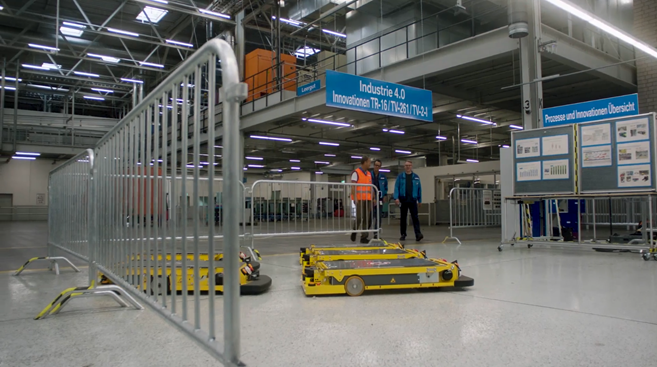A ROS-Industrial Collaboration with Microsoft and BMW
/ROS-Industrial recently had the opportunity to collaborate with Microsoft, BMW and Open Robotics on an automation solution that was featured in Season 3 of the Decoded show on YouTube. This enabled the ROS-I Consortium to realize sustainable gains on the team’s vision for greater efficiency and visibility with respect to logistics and material management challenges in assembly plants.
BMW has set forth a vision where they break down the barriers between the historical automation paradigms and the challenges with interacting with the largely manual operations of their ever-increasing high-mix assembly operations. Historically, materials are delivered to the line for human operators to consume and exact quantities and status are lost at that point of consumption. The idea is to leverage intelligent autonomous operation to give better visibility to what is where, while leveraging cloud technologies to create a tighter loop and connection to the order delivery systems. The goal is to enable a leaner operational buffer within the workflow, reducing carried inventory and driving greater efficiency.
This is where Microsoft came into the picture, with their Azure solutions and client support team to do rapid development sprints to enable tighter coupling between their SAP work order environment to the “to-be deployed” autonomous robotic fleet.
BMW has built a home-grown start transport robot that runs on the same battery used in the i3 model car they produce. However, there needed to be coordination of these assets over the long term with a richer simulation environment as the platform’s capability increased. This is where the Microsoft team came to deliver.
Originally, the Southwest Research Institute (SwRI) ROS-I team support was around navigation and evaluation of Gazebo in manufacturing environments supporting many mobile robots. It became clear as the Microsoft team got to work that Gazebo would not support spinning up multiple mobile robots in one instance. In fact, due to how Gazebo is structured, even a handful of robots brought Gazebo processing to a crawl. This led to the implementation of Argos, an open-source simulator that also has the capability to include physics as the scale BMW was interested in. A container strategy was developed and, in the end, the ROS-I team ended up learning quite a bit from the Microsoft team through the week-long development hack on SwRI’s campus. This development week really furthered the understanding of capability with regard to richer simulation capabilities, including the physics, which supports the ROS-I vision of tighter process performance and management of non-rigid bodies within the planning cycle.
As things got going in Germany, as the Decoded episode shows, the Microsoft team worked closely with BMW’s ROS and Manufacturing Execution System (MES) developers, tightly coupling the SAP functionality along with the fleet management and navigation tuning functionality that was required along with the Argos implementation. In the end, this led to a functional, if not sustainable, solution for the BMW team as they continued to refine the performance of the specific ROS-based robot, leveraging the Azure environment to assure SAP to simulation, to robot action within the Azure platform.
We hope those who watch this Decoded episode agree this demonstrates that collaborations between for-profit entities such as Microsoft, and nonprofits – such as SwRI, Open Robotics and Fraunhofer IPA, as well as open-source projects such as ROS-I – can enable end-users such as BMW to create their own sustainable, high performing solutions. We believe the open-source contributions will enable others to leverage the development and hopefully expand the capability. This idea of a pre-competitive foundation that enables interoperability and flexibility without generating silos is key if we are to move the ball forward with respect to operational efficiency gains at the scale we need.
As we have seen in recent months, robotics development and IT are entering a new phase, where more teams and individuals can grasp their own destiny and ROS-Industrial is excited to be a part of that journey!
Thanks to Microsoft and BMW as well as the Decoded team for making this project possible.




